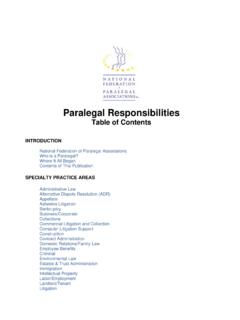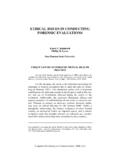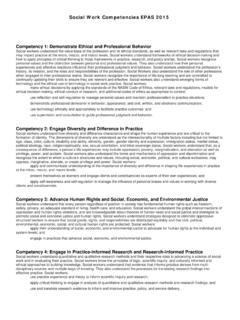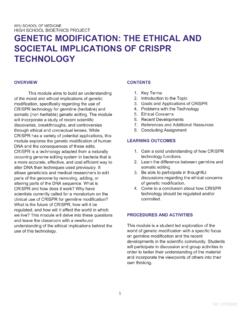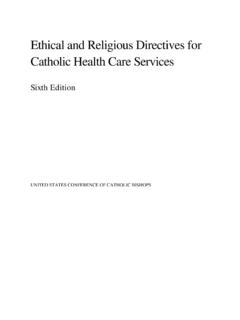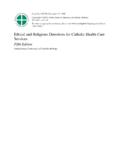Transcription of Model Code of Ethics 09 06 - paralegals.org
1 National Federation of Paralegal Associations, Inc. 2006 NATIONAL FEDERATION OF PARALEGAL ASSOCIATIONS, INC. Model CODE OF Ethics AND professional responsibility AND GUIDELINES FOR ENFORCEMENT PREAMBLE The National Federation of Paralegal Associations, Inc. ("NFPA") is a professional organization comprised of paralegal associations and individual paralegals throughout the United States and Canada. Members of NFPA have varying backgrounds, experiences, education and job responsibilities that reflect the diversity of the paralegal profession. NFPA promotes the growth, development and recognition of the paralegal profession as an integral partner in the delivery of legal services.
2 In May 1993 NFPA adopted its Model Code of Ethics and professional responsibility (" Model Code") to delineate the principles for Ethics and conduct to which every paralegal should aspire. Many paralegal associations throughout the United States have endorsed the concept and content of NFPA's Model Code through the adoption of their own ethical codes. In doing so, paralegals have confirmed the profession's commitment to increase the quality and efficiency of legal services, as well as recognized its responsibilities to the public, the legal community, and colleagues.
3 Paralegals have recognized, and will continue to recognize, that the profession must continue to evolve to enhance their roles in the delivery of legal services. With increased levels of responsibility comes the need to define and enforce mandatory rules of professional conduct. Enforcement of codes of paralegal conduct is a logical and necessary step to enhance and ensure the confidence of the legal community and the public in the integrity and professional responsibility of paralegals. In April 1997 NFPA adopted the Model Disciplinary Rules (" Model Rules") to make possible the enforcement of the Canons and ethical Considerations contained in the NFPA Model Code.
4 A concurrent determination was made that the Model Code of Ethics and professional responsibility , formerly aspirational in nature, should be recognized as setting forth the enforceable obligations of all paralegals. The Model Code and Model Rules offer a framework for professional discipline, either voluntarily or through formal regulatory programs. National Federation of Paralegal Associations, Inc. 2006 1. NFPA Model DISCIPLINARY RULES AND ethical CONSIDERATIONS A PARALEGAL SHALL ACHIEVE AND MAINTAIN A HIGH LEVEL OF COMPETENCE. ethical Considerations (a) A paralegal shall achieve competency through education, training, and work experience.
5 (b) A paralegal shall aspire to participate in a minimum of twelve (12) hours of continuing legal education, to include at least one (1) hour of Ethics education, every two (2) years in order to remain current on developments in the law. (c) A paralegal shall perform all assignments promptly and efficiently. A PARALEGAL SHALL MAINTAIN A HIGH LEVEL OF PERSONAL AND professional INTEGRITY. ethical Considerations (a) A paralegal shall not engage in any ex parte communications involving the courts or any other adjudicatory body in an attempt to exert undue influence or to obtain advantage or the benefit of only one party.
6 (b) A paralegal shall not communicate, or cause another to communicate, with a party the paralegal knows to be represented by a lawyer in a pending matter without the prior consent of the lawyer representing such other party. (c) A paralegal shall ensure that all timekeeping and billing records prepared by the paralegal are thorough, accurate, honest, and complete. (d) A paralegal shall not knowingly engage in fraudulent billing practices. Such practices may include, but are not limited to: inflation of hours billed to a client or employer; misrepresentation of the nature of tasks performed; and/or submission of fraudulent expense and disbursement documentation.
7 (e) A paralegal shall be scrupulous, thorough and honest in the identification and maintenance of all funds, securities, and other assets of a client and shall provide accurate accounting as appropriate. (f) A paralegal shall advise the proper authority of non-confidential knowledge of any dishonest or fraudulent acts by any person pertaining to the handling of the funds, securities or other assets of a client. The authority to whom the report is made shall depend on the nature and circumstances of the possible misconduct, ( , Ethics committees of law firms, corporations and/or paralegal associations, local or state bar associations, local prosecutors, administrative agencies, etc.)
8 Failure to report such knowledge is in itself misconduct and shall be treated as such under these rules. National Federation of Paralegal Associations, Inc. 2006 A PARALEGAL SHALL MAINTAIN A HIGH STANDARD OF professional CONDUCT. ethical Considerations (a) A paralegal shall refrain from engaging in any conduct that offends the dignity and decorum of proceedings before a court or other adjudicatory body and shall be respectful of all rules and procedures. (b) A paralegal shall avoid impropriety and the appearance of impropriety and shall not engage in any conduct that would adversely affect his/her fitness to practice.
9 Such conduct may include, but is not limited to: violence, dishonesty, interference with the administration of justice, and/or abuse of a professional position or public office. (c) Should a paralegal's fitness to practice be compromised by physical or mental illness, causing that paralegal to commit an act that is in direct violation of the Model Code/ Model Rules and/or the rules and/or laws governing the jurisdiction in which the paralegal practices, that paralegal may be protected from sanction upon review of the nature and circumstances of that illness.
10 (d) A paralegal shall advise the proper authority of non-confidential knowledge of any action of another legal professional that clearly demonstrates fraud, deceit, dishonesty, or misrepresentation. The authority to whom the report is made shall depend on the nature and circumstances of the possible misconduct, ( , Ethics committees of law firms, corporations and/or paralegal associations, local or state bar associations, local prosecutors, administrative agencies, etc.). Failure to report such knowledge is in itself misconduct and shall be treated as such under these rules.
